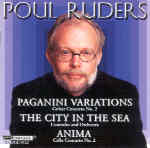Poul Ruders’ music is expressionistic in the best sense of the term: exciting, extreme, violent, hallucinatory, and often strikingly beautiful–it grabs you by the throat and never lets go. That’s certainly true of the Paganini Variations (Guitar Concerto No. 2), based on the same tune used by Rachmaninov, Brahms, Lutoslawski, et al. A bit under 18 minutes in length, Ruders packs into it enough incident for a piece twice as long, and it sounds like the most frighteningly difficult thing every written for the guitar. Like all good variation sets, it alternates passages in which the tune comes across clearly with those in which it’s more difficult to discern, and the style ranges from grindingly dissonant to the harmonically pellucid 14th variation. Most of all, the music simply flows, and it all culminates in an insane prestissimo finale that flies away leaving behind only a quizzical note on the piccolo. How guitarist David Starobin gets all of those notes under his fingers and maintains such impressive accuracy of rhythm and pitch is anyone’s guess, but manage it he does. It’s an amazingly virtuosic display of supreme musicianship.
The City in the Sea dates from 1990, and sets an apt lurid poem by Edgar Allan Poe. Contralto Mette Ejsing has just the right, hollow timbre to her voice to convey the full gloomy weight of the text, and Ruders has contrived an especially effective orchestral interlude between the poem’s two halves. The vocal line is more declamatory than lyrical, but as an exercise in pure atmosphere the piece is quite compelling. Anima (Cello Concerto No. 2) presents a more lyrical, less angry Ruders than usual, but this fact only emphasizes the high level of musical craftsmanship that the purely physical impact of his splashier works tends to make us forget. Expertly scored for small orchestra (no percussion), Ruders has produced a lovely and idiomatically written piece that seems to grow right out the cello’s natural singing timbre. I suppose you might call the work “atonal” in a sense, but Ruders sustains minute after minute of eloquent cantabile writing with such assurance that it’s impossible not to come away impressed with the sheer mellifluous beauty of it all.
Cellist Michaela Fukacova does a fine job floating the music’s long, arching lines, and Jan Wagner offers her, Starobin, and Ejsing finely shaped accompaniments at the helm of a confident sounding Odense Symphony Orchestra. Ruders’ music can be very difficult to balance; Paganini Variations in particular offers a serious challenge given its tricky interplay between (amplified) guitar and orchestra. In this respect the recorded sound captured by Bridge represents something of a miracle as regards both clarity and impact. In sum, this new disc only confirms Ruders’ credentials, in the wake of the his great recent success with the opera The Handmaid’s Tale, as a truly major voice in contemporary music, working at the absolute peak of his form. [11/30/2002]
































